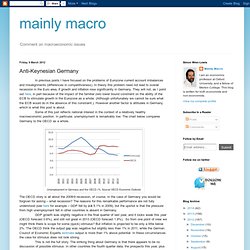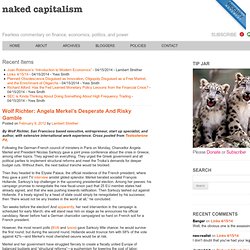

Germany is a weight on the world.
The US Treasury is right about Germany’s Eurozone policies: Here is why. On 30th October, in its Report to Congress on Economic and Exchange Rate Policies, the US Treasury took a swipe at Germany, accusing it of exporting economic depression to the rest of Eurozone and, indeed, to the global economy.

The euro crisis: Blame Germany, for Frankfurt? Meme-evaporating of the day: the Nazis could rise to power because of high unemployment, not because of high inflation. Anti-Keynesian Germany. In previous posts I have focused on the problems of Eurozone current account imbalances and misalignments (differences in competitiveness).

In theory this problem need not lead to overall recession in the Euro area, if growth and inflation rose significantly in Germany. What are the German Bankers Thinking?
Chart of the Day: Germany in breach of Maastricht Treaty in 8 of 10 years since 2002. In-depth analysis on Credit Writedowns Pro. Koo on German bubbles. Israel's Mistake: German Minister Denied Entry to Gaza Strip - SPIEGEL ONLINE - News - International. One thing should be made clear from the start: Over the years, German Development Minister Dirk Niebel has never passed up an opportunity for headline-grabbing populism.

As a leading member of the Free Democrats (FDP) -- Chancellor Angela Merkel's junior coalition partners -- he supported his party's untenable calls for tax cuts. He was also a co-author of a party position paper which called for the abolition of the position of development minister. Once they joined Merkel's government last autumn, Niebel was handed the Development Ministry. Thus, when Niebel, currently on a trip to the Middle East, was prevented by Israeli authorities from entering the Gaza Strip to check up on the progress of a sewage treatment plant being funded by Germany, it seemed fair to ask what exactly his intentions were. Indeed, his ensuing critique of the Israelis, one could imagine, may have been intended for the voters back home.
That is one aspect of this story. "I too was a member of the Zionist movement": Gilbert Achcar on Philo- and Anti-Semitism in Germany. This interview is part of a longer one conducted with Gilbert Achcar in Berlin on 18 and 20 May discussing his book, The Arabs and the Holocaust which was translated into German in May 2012.

The interview explores intersecting paradigms and predicaments of racism and colonialism for a post-war German nation. Specifically, it touches upon some of the historical roots and contemporary debates in Germany, concerning anti-Semitism and philo-Semitism and the way both phenomena have played out in modern German politics until today. Anna Younes (AY): As someone who was socialized and grew up in Lebanon, it is not immediately clear why you would write a book about The Arabs and the Holocaust. Heiner Flassbeck: Is Mercantilism Doomed to Fail? 2/5. German Mercantilism and the Failure of the Eurozone, Guest Post by Heiner Flassbeck. One of the most poignant analyses of the deeper causes of the Euro Crisis, amongst the many presented in INET’s Berlin Conference, was a paper entitled ‘German Mercantilism and the Failure of the Eurozone’, by Heiner Flassbeck.

With the author’s kind permission, I reproduce it here for your benefit. Enjoy. (You can watch Heiner’s presentation here.) A German Pirate Party could bring a European coalition. Chiang Mai, Thailand - New social movements always start first as a new subculture, consisting of people who invent new social practices.

The Swedish filesharing communities that lay at the root of the Swedish Pirate Party simply consisted of music lovers who wanted to share their music and discoveries. In a second moment, the sharing communities discovered that such sharing was actually illegal, because the feudal property modalities still attached to intellectual property do not give the user sovereignty over their acquired material, but subject it to a prohibition of sharing, in order to ensure a guaranteed rent income to global entertainment corporations.
However, a third moment in the evolution of a new social movement and culture is always inevitable. It is the moment when of discovery: in order to ensure their survival and development, political power is vital.
"Germany’s Sunshine Daydream" by Bjørn Lomborg. Exit from comment view mode.

Click to hide this space COPENHAGEN – One of the world’s biggest green-energy public-policy experiments is coming to a bitter end in Germany, with important lessons for policymakers elsewhere. Germany once prided itself on being the “photovoltaic world champion”, doling out generous subsidies – totaling more than $130 billion, according to research from Germany’s Ruhr University – to citizens to invest in solar energy. But now the German government is vowing to cut the subsidies sooner than planned, and to phase out support over the next five years.
What went wrong? There is a fundamental problem with subsidizing inefficient green technology: it is affordable only if it is done in tiny, tokenistic amounts. According to Der Spiegel, even members of Chancellor Angela Merkel’s staff are now describing the policy as a massive money pit. Germany’s enthusiasm for solar power is understandable. Using solar, Germany is paying about $1,000 per ton of CO2 reduced. Now A Housing Bubble In Germany. Germans are practically euphoric these days—compared to the dour mood that prevailed for nearly two decades following reunification, when real wages declined in a stagnating economy beset with what appeared to be permanently high unemployment.

While discontent smolders in other Eurozone countries, 88% of Germans are satisfied with their standard of living (Gallup). And 85%—a record since the beginning of the surveys—believe that they can get ahead if they work hard, up from 71% in 2007. This optimism is joyriding the powerful German export machine, an optimism that appears to be impervious to the nightmarish scenarios playing out at the periphery of the Eurozone. And it still hasn’t reacted to what may be the onset of a recession in Germany as the economic superstar has smacked into a wall.
Read.... And now, Germans have something else to be euphoric about (for a while, at least): a housing bubble. The German housing market stagnated after reunification. . - Record low financing costs. Insight: The dark side of Germany's jobs miracle. Why Won’t Germany Turn? Joseph Halevi’s insightful analysis, circa 1995. Wolf Richter: Angela Merkel’s Desperate And Risky Gamble. By Wolf Richter, San Francisco based executive, entrepreneur, start up specialist, and author, with extensive international work experience.

Cross posted from Testosterone Pit. Following the German-French council of ministers in Paris on Monday, Chancellor Angela Merkel and President Nicolas Sarkozy gave a joint press conference about the crisis in Greece, among other topics. They agreed on everything. They urged the Greek government and all political parties to implement structural reforms and meet the Troika’s demands for deeper budget cuts. Without them, the next bailout tranche would be blocked.